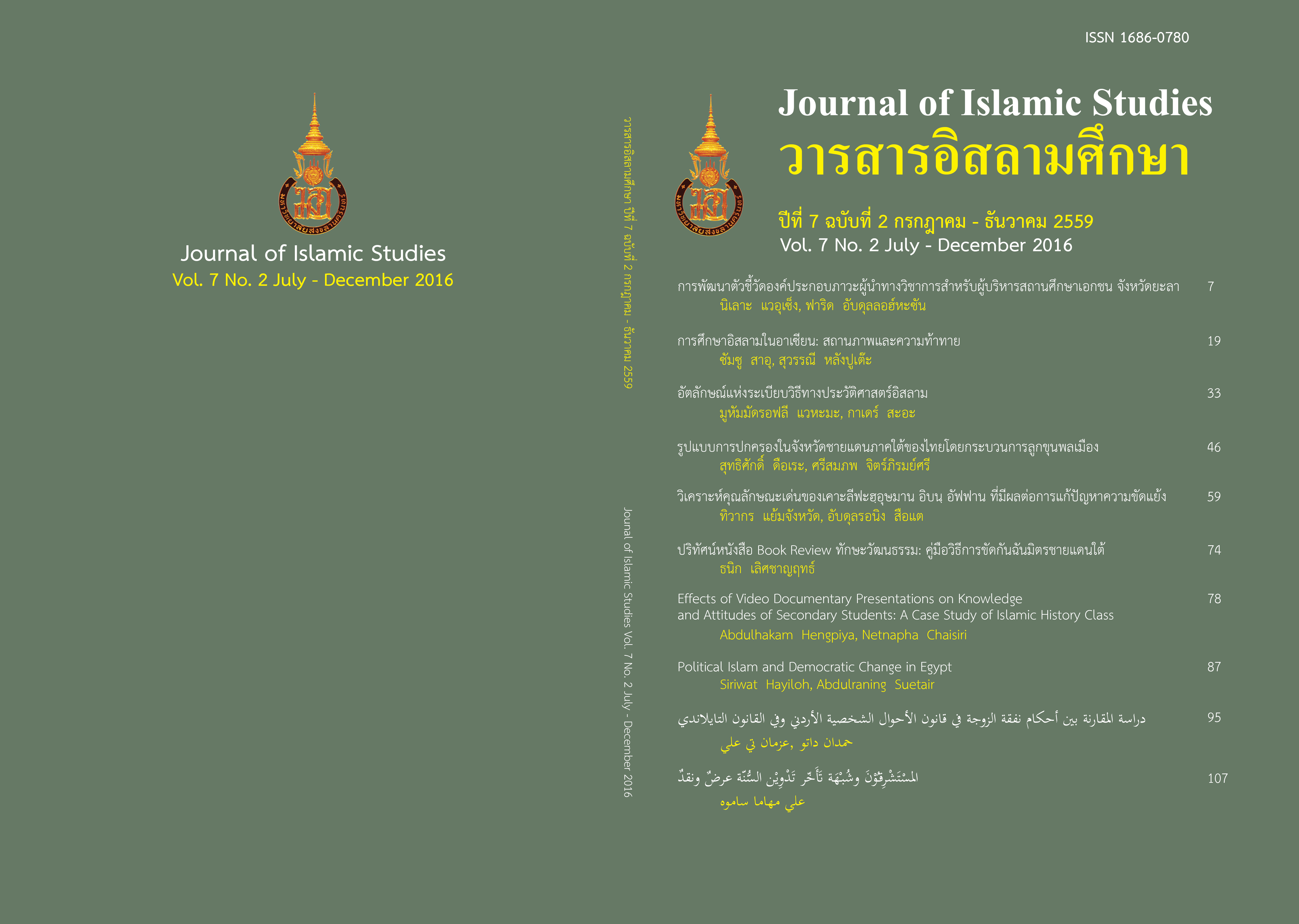Research Methodology of Islamic History
Keywords:
Islamic History, Historical Methodology, Historical FactsAbstract
Historical research aims to find historical facts of the human beings through historical methodology to reflect the facts of the past that closer to the truth. Even though, Islamic history is like a general history that applies methodology and systematic inquiry data processing, nevertheless it has its own identity, especially in the early Islamic history, which is closely related to the religion. However, it has some methods that are different from general history methodology. This article intends to present some aspects of Islamic methodology in four main areas; classification of evidence, examination of evidence, criticism as well as interpretation of Islamic historical evidence. The study found that the Islamic historical methodology is quite different from general history in some aspects. Such differences are still preserved for the academic accuracy and as such do not reduce the credibility of Islamic history.
References
อดิศร ศักดิ์สูง. (2552). ความคิดทางประวัติศาสตร์และวิธีวิทยาวิจัย. สงขลา: ศูนย์หนังสือมหาวิทยาลัยทักษิณ
Abdullah, Yusri Abdul Ghani. (2004). Historiografi Islam Dari Klasik Hingga Modern. Budi Sudrajat M.A., translator. Jakarta: Raja Grafindo Persada.
Bajaj, Satish K. (1998). Research Methodology in History. New Delhi: Anmol Publications PVT. Ltd.
Grine, Fadila; et al. (2013). Islamic Historical Writing: A Critical Analysis. Middle-East Journal of Scientific Research. 13(3): 303-313.
Al-Hilwani, Sa’d Badir. (1999). Madkhal Ilā ‘Ilm al-Tarikh wa Manāhij al-Bahth Fihi (مدخل إلى علم التاريخ ومناهج البحث فيه). N.p.
Ibn ‘Abdullah Ala Hamid, Sa‘d. (2000). Turuq al-Takhrij al-Hadith (طرق التخريج الحديث). Riyad: Dar ‘Ulum al-Sunnah.
Ibn Ishaq, Muhammad. (1988).Siyar (PeygamberTarihi). Istanbul: Akabe.
Muslim, Abu al-Husayn Muslim Ibn al-Hajjaj al-Qushayri al-Naysaburi. (1991). Sahih Muslim (صحيح مسلم). Muhammad Fu’ad ‘Abdulbaqi, tahqiq. Vol.I-V. Beirut: Dar al-Kutub al-‘Ilmiyah.
Nu’mani, AllamahShibli. (2001). Sirat-un-Nabi: The Life of the Prophet (P.B.U.H.). M. TayyibBudayuni, translator. Vol.I. New Delhi :Rightway Publications.
Al-Sharif, Muhammad Ibn Musa. (2008). Dawabit Manhajiyah fi ‘Ard al-Sirah al-Nabawiyah (ضوابط منهجية في عرض السيرة النبوية). www.altareekh.com (accessed May 5, 2011).
Togan, A. ZekiVelidi. (1985). Tarihte Usul. Istanbul: Enderun Kitab evi.
Al-‘Umari, AkramDiya’. (1994). Al-Sirah al-Nabawiyah al-Sahihah (السيرة النبوية الصحيحة). Vol.I-II. Al-Madinah al-Munawwarah: Maktabah al-‘Ulum wa al-Hikam.
White, Ali. (2009). An Islamic Approach to Studying History: Reflections on Ibn Khaldun’s Deterministic Historical Approach. Intellectual Discourse. Vol. 17, No 2, p 221-244.
Yatim, H. Badri. (1997). Historiographi Islam. Jakarta: PT Logos Wacana Ilmu.
Zayn al-'Abdin, Muhammad Surur Ibn Nayif. (1988). Dirasat fi al-Sirah al-Nabawiyah (دراسات في السيرة النبوية). Birmingham: Dar al-Arqam.
Downloads
Published
How to Cite
Issue
Section
License
Copyright (c) 2016 Journal of Islamic Studies, Prince of Songkla University, Pattani Campus

This work is licensed under a Creative Commons Attribution 4.0 International License.
All articles Published in The Journal of Islamic Studies are author’s opinions, and not the responsibility of the Faculty of Islamic Sciences nor the editorial board. However any citation should be referred to the journal.
















